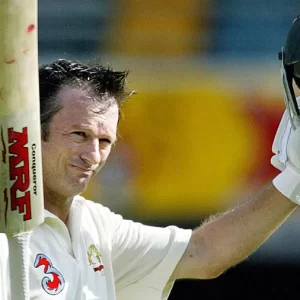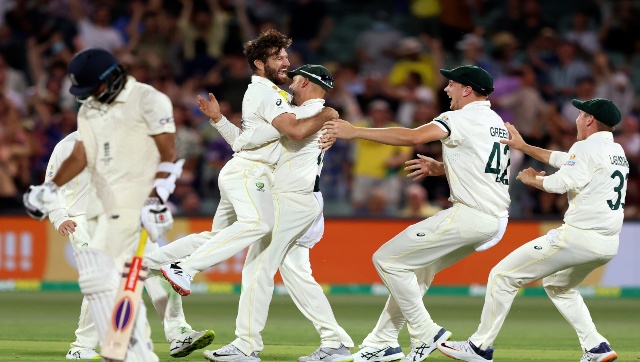Before you go onto read Steve Waugh the epitome of Aussie spirit 2, please read part 1 here.
Waugh gumption to drop Warne
Waugh and Warne were good friends during the initial stage of their respective careers. After one famous incident, they drifted apart. In this I must commend the decision making of Waugh. Shane Warne had just returned from a surgery. He was out of action for more than a year and during this time, Stuart MacGill had established himself as a worthy replacement for Warne. He took wickets with his huge turning leg-breaks. After Warne returned, being the great bowler that he was and being the senior, he had to be accommodated. During the tour of the West Indies Warne was clearly struggling to pick up wickets whereas MacGill was slightly better than Warne.
Moreover, Australia were 1-2 down needing to win the final test to retain the Frank Worrell trophy. It was under such circumstances, Waugh took the momentous decision. It calls for great courage and bravery to drop one of the greats of the game. That single decision showed the real competitive Steve Waugh. He wasn’t afraid to take the huge and tough decisions. For him, all that mattered was winning. He will go to great lengths to achieve that. Needless to say, Australia went onto win that Test.
Waugh explains
“It was my first tour as captain to West Indies. As a captain, you are expected to make difficult decisions. That’s why you are given the job. You are not there to please everyone. I always wanted to be loyal to be my players to a certain point, but at the end of the day, you gotta be loyal to the team and their performance,” Waugh said
“Warnie had just come back from a shoulder surgery. I think he was put back into the team too quickly. We had both Stuart Macgill and him in the previous Test, turning the ball the same way. Lara, and all the left-handers were hitting with the spin, and I just thought it was the right decision,” he added.
“I didn’t consult too many players. I think, when you are consult too many people, as a captain, you get confused. At the end of the day, you are there to make the decision, it was a tough one, of course,” said the man under whom Warne played a lot of Test matches after that rare snub.
This one decision irrevocably fractured the relationship between Warne and Waugh.
Steve Waugh’s autobiography
It is a lengthy book and quite heavy too. 800 pages. Probably, the longest book a cricketer has ever written. You just cannot hold onto the book for too long on your hands. It must be rested on a table. However, it is a wonderfully written and articulated book. It is simply irresistible. One can learn about the Steve Waugh right from his childhood. It is clear that Waugh placed tremendous importance and poured lot of energy in writing the book. It is unlike the book that was written by Sachin Tendulkar or Saurav Ganguly which was more of an espncricinfo.com match report. All you have to do is go to that website, search for the matches Tendulkar or Ganguly are involved in and read the report whereas Waugh’s is a magnum opus.
I have read it twice and it is a keeper. Even if the book is tattered, I will not hesitate to buy another one.
Waugh has covered all the important passages of his career. The match fixing controversy involving his brother, the World Cup wins, the Ashes success and most importantly, the decision to drop Warne. He talks about his initial failure when after getting a lot of chances, he just simply wasn’t able to pull it off. He was neither scoring runs nor was his picking up wickets.
“For me,” he explains, “the hardest part about not doing well was that I began to think I was a failure not just as a player but as a person too.”
There are so many other details in this book that I will need to write a separate blog about his autobiography.
Complete eradication of the last Test loss
Under Allan Border, Australia rose from the ashes. Under Mark Taylor, they established themselves as a force to be reckoned with. Australia were winning Tests and series regularly wherever they went. They made a mincemeat of England whenever they met. South Africa competed but they were never able to overcome Australia. The rest, were mostly non-existent. Nevertheless, Australia found ways to lose the last Test of any series. Either because of homesick or because having been contented that they have already won the series or whatever, they lost a lot of inconsequential games. It was Steve Waugh who set off to rectify this mistake. He hated losing.
Under him, Australia became even more tougher team. They planned to win every cricket game. It does not matter whether the series was won already. Ruthlessness was what Waugh required. He did not want his team members to become complacent or satisfied with series wins. In John Buchanan, he had an ideal foil as the coach. Together, they changed the face of Australian cricket itself. Now, every game was treated important. Final test or not, it must be won. It was this attitude that paved the way for some record winning streaks.
16 consecutive Test wins. Twice. Once under Steve and another under Ponting. Australia did not lose a single game in two consecutive World Cups. 2003 and 2017. That winning streak extended for more than 30 games. It is a record that will probably never be erased. I do not see any team winning this many games consecutively.
Steve Waugh’s brand of sledging
Was Steve Waugh faultless? Certainly not. Was he guilty of sugar coating sledging? Absolutely yes. Mental disintegration. This was the coinage Waugh gave for sledging. I can never agree with abusive behaviour on the field of play. The Australians always talk about never crossing the line. They hide behind that line. What is that line? Where is that line? Who had drawn that line? The Aussies always keep extending the line when it suits them. Waugh was at the forefront of that. He institutionalised sledging. The behaviour of the Australians under Waugh was outrageous. They found pleasure in constantly abusing the opponents. It is a shame that Waugh never realised that throughout his career.
Other blogs about Australia



